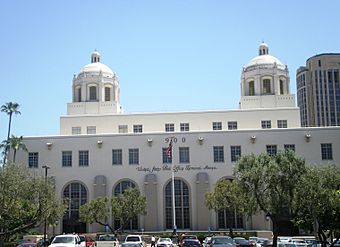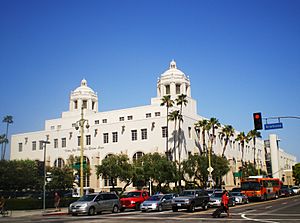U.S. Post Office-Los Angeles Terminal Annex facts for kids
Quick facts for kids |
|
|
United States Post Office
Los Angeles Terminal Annex |
|

Terminal Annex in 2008
|
|
| Location | 900 N. Alameda St., Los Angeles, California |
|---|---|
| Area | 3.8 acres (1.5 ha) |
| Built | 1940 (completed) |
| Architect | Gilbert Stanley Underwood |
| Architectural style | Mission Revival-Spanish Colonial Revival |
| MPS | US Post Office in California 1900-1941 TR |
| NRHP reference No. | 85000131 |
| Added to NRHP | January 11, 1985 |
The Terminal Annex is a famous building in Los Angeles, California. It used to be the main place where all mail for Los Angeles was sorted. This happened from 1940 to 1989.
It's located near Union Station. The building has a special look, called Mission Revival and Spanish Colonial Revival style. A famous architect named Gilbert Stanley Underwood designed it. Because it's so important and beautiful, it was added to the National Register of Historic Places in 1985.
Contents
Building the Terminal Annex
The Terminal Annex was designed by Gilbert Stanley Underwood. It was built between 1939 and 1940. The main goal for this building was to handle all the mail coming into and leaving Los Angeles.
Even though it was a working building, Underwood wanted it to look nice. He made sure its design matched Union Station, which opened nearby in 1939. The original building had three floors and two tall towers. It had a huge amount of space, about 400,000 square feet.
Opening and Early Operations
The new mail building cost $3 million to build. It opened in May 1940. Over 1,600 people worked there, including clerks and mail carriers. Their job was to sort about 2 million pieces of mail every single day!
The facility was open 24 hours a day. It had the newest machines to handle mail quickly. These included conveyor belts, chutes, weighing machines, and sorting tables. When it first opened, people said it was the "most modern and efficient" post office in the country.
Growing Pains and Expansion
Just ten years after it opened, the city's mail had already grown too much for the building. In 1950, the Post Office decided to make it bigger. They planned a $12 million expansion. This included adding a new five-story building just for packages.
Moving to a New Facility
By the 1980s, even the expanded Terminal Annex was too small. The amount of mail had grown to 14 million pieces every day! The building was too crowded, and there wasn't enough space for workers.
So, in 1984, the Postal Service decided to build a brand new, much larger post office. This new facility opened in 1989 in South Los Angeles. It took over as the city's main mail-processing center.
Terminal Annex Today
Today, the Terminal Annex building is used for different things. Most of the building is now a data center. This is a secure place where computer servers store and manage information. It is not open to the public.
However, part of the building still has a postal counter. You can buy stamps there and pick up mail if you rent a mailbox.
Filming Location
After the Postal Service moved out in 1995, the building became a popular spot for movies and TV shows.
- In 1995, it was used for the movie Dear God.
- In 1996, it was used for the TV show EZ Streets. For these, the main lobby, which has cool murals, was made to look like a city hall.
- It was also changed into a hospital for the movie City of Angels. They even added an emergency room entrance!
Lobby Murals
The lobby of the Terminal Annex has 12 amazing murals. These large paintings were created by an artist named Boris Deutsch. He painted them between 1941 and 1944. They are part of the Section of Painting and Sculpture art program.
Historic Building
The Terminal Annex building was added to the National Register of Historic Places in 1985. This happened because of its unique and important architectural style.



